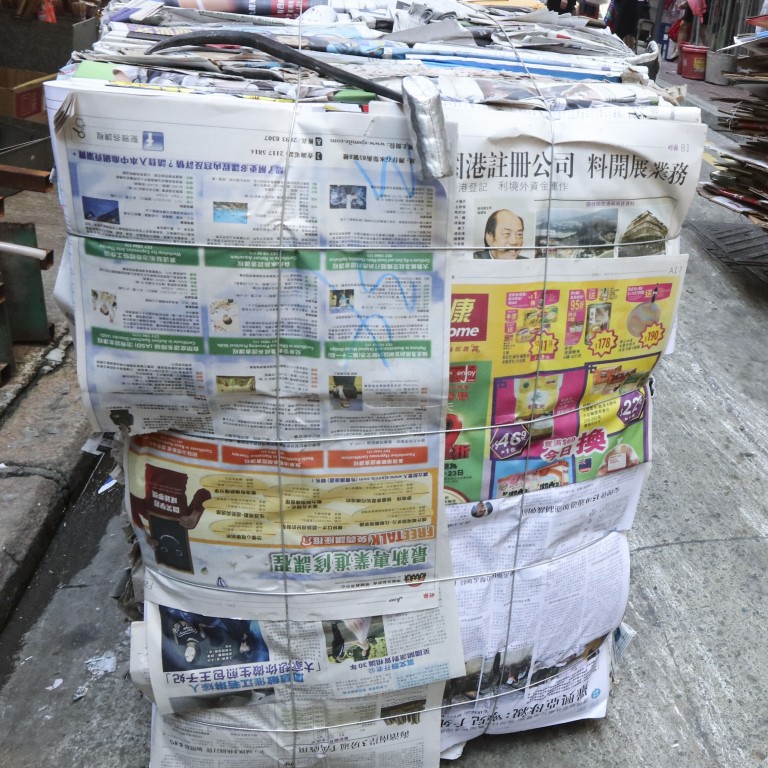
Recycling in Hong Kong takes another hit as plan for waste paper processing ‘falls through’
- City must find ways to deal with its paper waste, with looming ban on exports to mainland
- Industry players say new pulping facility may replace earlier proposal for a recycling plant
A plan for a recycling and manufacturing plant to process up to a third of Hong Kong’s waste paper is unlikely to happen, with the government now considering building a pulping facility instead, industry sources have said.
Rocsky International Limited was awarded a 20-year lease in December 2018 for four adjacent lots at the EcoPark in Tuen Mun to build and operate a paper recycling and manufacturing plant by 2023.
However, industry sources said the company now appeared unable to meet the terms of its contract with the Environmental Protection Department.
The department declined to confirm the development or provide more information about the recycling plant plan.

Responding to questions from the Post, a spokeswoman would only say: “If any tenant of EcoPark is unable to start operations on schedule or meet the terms of the lease, the department will handle it according to the contract terms.”
However, industry sources said the government had already begun consulting them about a new plant to turn waste paper into pulp, the raw material for paper products.
A source said: “It does not seem likely to have two facilities essentially performing the same function within EcoPark, so we think the paper factory is likely to fold.”
A second source confirmed hearing that the recycling plant was being scrapped.
The Post has reached out to Rocsky International for comment.
Does Hong Kong face another ‘paper jam’ crisis as recycling woes return?
For years, almost all of Hong Kong’s waste paper has been exported to mainland China, but this will stop at the end of the year.
Beijing announced in 2018 that the mainland would stop accepting imports of polluting waste including paper, plastic and metals. It set varying quotas on waste paper imports before halting them completely after December 31 this year.
The total daily amount of waste paper in Hong Kong has been rising, reaching 2,702 tonnes in 2018, a 6.7 per cent increase from the year before.
The recycling rate of waste paper, the second-largest portion of municipal solid waste, has declined from 46 per cent in 2017 to 41 per cent in 2018. The department said this was because of tightened import controls on the mainland and elsewhere.
While some Southeast Asian countries accept waste paper imports, restrictions have been tightening there too in recent years, and exporters are put off because it costs more to ship the waste there.
The paper recycling and manufacturing plant at EcoPark was touted as a way to deal with the city’s waste paper locally. The plant was expected to process up to 300,000 tonnes of waste paper a year, a third of the city’s total.
Glass recycler says shutdown of bars, nightclubs a blow shaky industry can ill afford
Currently there is one other pulping factory in Hong Kong run by a private company that focuses mainly on waste drink cartons, handling 10 tonnes a day.
The government has begun providing up to HK$300 million (US$38.7 million) a year to subsidise contractors to collect, sort and package waste paper for export. It selected 17 contractors for the scheme, which started on September 19.
Sources said a pulping centre might prove more cost-effective than building the recycling and manufacturing plant.
“With pulping, you only need to do half the work. If we produce paper, the final product would have to compete with those from China as well,” said Jacky Lau Yiu-shing, director of the Recycle Materials and Reproduction Business General Association.
The government cannot behave like it is still business as usual. It needs to actively intervene or we will face a crisis
The Green Earth, a local environment group, was in favour of having a pulping facility. “It will use fewer resources, needs less technical knowledge and less space,” said the group’s executive director, Edwin Lau Che-feng.
Because pulp is not considered waste, it can be exported to China, as well as Southeast Asia, he added.
However, Lau warned Hong Kong could face a recycling crisis if the government did not provide more subsidies to exporters of waste paper between the time the Chinese ban kicked in, and the facility started operating.
“The government cannot behave like it is still business as usual. It needs to actively intervene or we will face a crisis,” he said.

